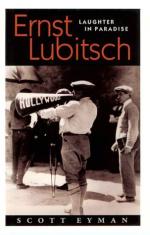|
This section contains 388 words (approx. 2 pages at 300 words per page) |
Encyclopedia of World Biography on Ernst Lubitsch
The German-American film director Ernst Lubitsch (1892-1947) is recognized as one of the comic masters of the cinema. A brilliant craftsman, he is chiefly admired for his witty political satires and inventive bedroom farces.
Ernst Lubitsch was the son of a Berlin storekeeper. As a young man, he worked as assistant to the noted theatrical director Max Reinhardt and later established himself as a talented actor in silent films, many of which he directed. Beginning in 1913, Lubitsch played the role of a clothing store salesman in a series of short movies, achieving a popularity with German audiences comparable to that of Charlie Chaplin in America. The Eyes of the Mummy (1918) was Lubitsch's first feature-length film; that same year he directed his own version of Carmen, called Gypsy Blood. The popularity of his two large-scale historical productions, Passion (1919), the story of Madame de Pompadour starring Pola Negri, and Deception (1920), about Anne Boleyn and Henry VIII, brought him numerous offers from American motion picture studios. In 1924 he left for Hollywood.
Coming under the influence of Chaplin and of Cecil B. DeMille's sophisticated comedies, Lubitsch established his creative independence by hiring his own German staff and embarking on a series of hilarious, visually imaginative bedroom farces. The most memorable were The Marriage Circle (1924), Kiss Me Again (1925), and So This Is Paris (1926). In 1924 Lubitsch directed a scathing satire of the Hollywood film industry, Forbidden Paradise.
Lubitsch's facility with the camera and his love of slapstick made him an ideal silent-film director, and his rapport with actors and his gift for verbal subtleties rendered him equally adept with the sound medium. His first talking movies, the Maurice Chevalier-Jeanette MacDonald series, were stylishly entertaining. However, his later work gained in wit and intellectual sophistication. Monte Carlo (1930) and Trouble in Paradise (1932) are superior, the latter considered by most critics to be his finest film.
In 1939 Lubitsch directed Greta Garbo in his most popular production, Ninotchka. Shop around the Corner (1940), a modest drama notable for its atmosphere and vivid characterization, and To Be or Not To Be (1942), a controversial comedy described by Lubitsch as "a satirization of the Nazi spirit and the foul Nazi humor," are among the director's most creative efforts. His last production, Heaven Can Wait (1943), is an intelligent exploration of a rogue's life while he waits at the gates of hell.
|
This section contains 388 words (approx. 2 pages at 300 words per page) |


